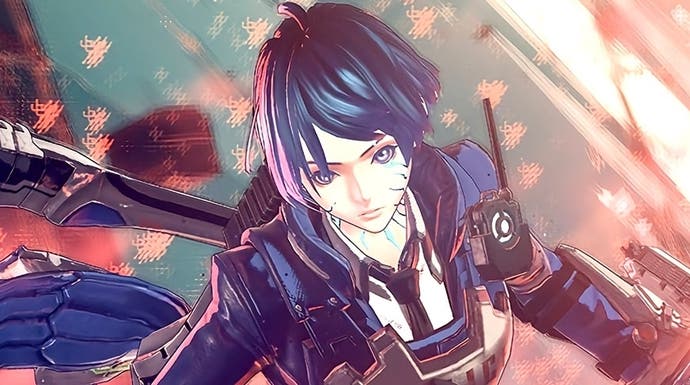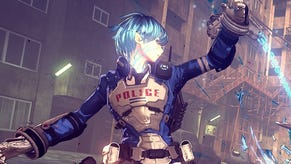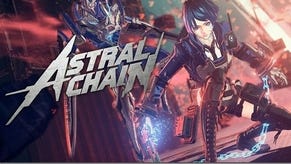Astral Chain: the Switch exclusive that pushes Platinum Games in new directions
Bayonetta meets Arkham meets Deus Ex?
It's been more than 10 years since Platinum Games unleashed its first project and since then, the Osaka-based studio has defined and redefined the action game with brilliant releases including Bayonetta, Vanquish and Metal Gear Rising: Revengeance. But there's a sense that the firm wants to take its signature style in new directions: Nier: Automata produced brilliant results and the newly released Astral Chain is the next stage in the company's evolution.
Combining its established arcade action with exploration, investigation, story-telling and puzzle solving, Astral Chain stands as one of Platinum's most ambitious projects to date. It's also a very difficult game to describe. As you would expect, combat plays a significant role, but this time the scope of the experience has been expanded. It has been described as a 'synergetic action game' - a descriptor that refers to the eponymous Astral Chain - which links the player character with a being known as a Legion, a mechanic that influences almost every aspect of the gameplay. From combat and investigation to simple traversal, the bond between the player and this Legion is key.
At its core, Astral Chain is Platinum's take on a Cyberpunk-style world, influenced by the designs of genre epics like Ghost in the Shell and Appleseed. The world is split between puddle-soaked streets, dilapidated back alleys, the pristine Neuron HQ and the alternate dimension from which the game's primary threat has arisen. As expected, Astral Chain is based on Platinum's in-house technology and there is a focus more on pushing the Switch hardware and getting the most out of the fantastic art design.
Even the introductory sequence on the bike is a nice showcase for how good current-gen lighting and post-processing techniques work when combined with gorgeous art direction. What we're looking at is a relatively simplistic tunnel using cube-maps, per-pixel motion blur and lens flares not to mention a nice mix of particles and great modeling. There's nothing ground-breaking here, but the composition comes together to create something that is surprisingly beautiful. It's a showcase of strong artwork and skilled development above all else.
That said, there are some neat visual effects on display bearing in mind the very limited GPU power Platinum has to work with. The depth of field implementation, for instance, is a clever attempt to simulate camera bokeh in a cinematic way an there's a subtle motion blur applied to objects in motion, lending animations additional heft. Particle effects are surprisingly rich and beautifully detailed, while the skybox and its use of colour is just fantastic. I feel it's more attractive, more often compared to the technically superior Nier: Automata - which often felt a little rough around the edges.
Pushing graphics hard does require compromise, of course, with the primary trade taking the form of a drop from Platinum's preferred 60fps down to a target 30fps instead. Despite doubling per-frame render time, the studio still aims to maximise visual results, and that starts with in-game native resolution. Unlike the Switch ports of Bayonetta, Astral Chain can reach resolutions exceeding 720p in docked mode. However, this time, the team has opted to utilise dynamic resolution to stabilise performance.
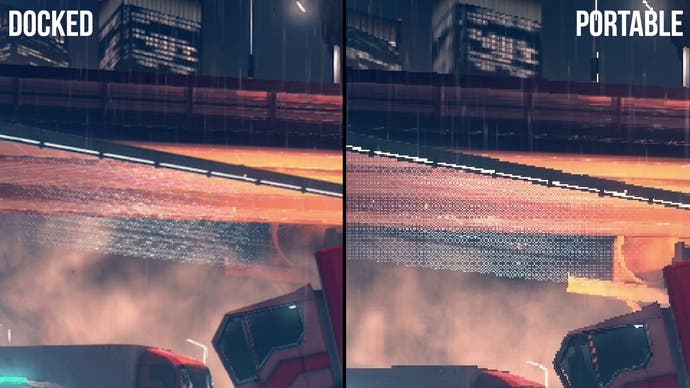
When docked, pixel counts typically range between 720p and 900p, hitting around 810p on average. This is paired with a post-processing solution for anti-aliasing, leading to slightly sharper but still somewhat murky image quality. Considering the hardware, however, overall image quality is good enough and certainly an improvement over Bayonetta.
Predictably, portable mode maxes out at 720p and similar to docked, uses dynamic resolution scaling - but there is a massive difference between the two resulting in something we've not really seen before on Switch - a new approach that works rather nicely. In mobile mode, the game runs without any anti-aliasing at all and when the resolution does dip below 720p, it's scaled back up without linear filtering resulting in uneven pixel edges. It looks very rough in screenshots and video capture but on the Switch screen itself, it's almost impossible to see. The result? The game looks really sharp when played in portable mode and arguably more presentable than the docked output when blown up on a large TV.
Performance matters in an action game, so the question is whether Platinum's approach plays off with a consistent frame-rate. Happily, the results are solid for the most part. Astral Chain maintains 30 frames per second in most situations. Exploration is mostly perfect and running around the world delivers stable performance, as you would hope. In combat, things are slightly more variable. While the target is reached most of the time, it's not quite a 30fps lock. Frame-rate can momentarily drop below 30 frames per second, but the impact to fluidity isn't that bad and is relatively fleeting. The resolution drop in portable mode pays off too as the overall experience is very, very similar to docked performance.
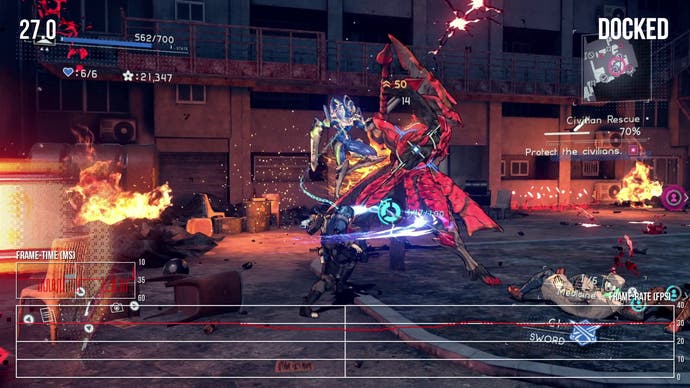
Overall, Astral Chain is an excellent Switch release, but I do have one unexpected complaint. For reasons unknown, there's no support for surround sound. On my 7.1 setup, the game only delivers audio only the left and right channels, with the remaining speakers remaining silent throughout. This isn't the first Switch game to exhibit this issue but it's strange nonetheless. On the plus side, the audio itself is excellent and the soundtrack is first class.
Taken as a whole though, I really enjoyed Astral Chain. Image quality isn't quite top tier but the visuals on display are often beautiful and the world design itself is compelling. It has a unique atmosphere that differs from most other Platinum titles - and I really enjoyed that.Beyond the presentation, the game itself is highly engaging. While combat remains as solid as ever and features an excellent twist, it's the overall progression that I found most fascinating. It's a more slowly paced experience compared to the typical Platinum action game but the exploration and puzzle solving adds a lot of variety to the mix.
I started this piece by saying that Astral Chain is rather difficult to describe but suffice to say that its Cyberpunk-inspired aesthetic, gorgeous art direction and Platinum arcade action all hit the target. But there's more to it than that - while it's very different game compared to something like Deus Ex, it has a very similar same ebb and flow between its high intensity action and its quiet moments and for me, that works wonderfully.
